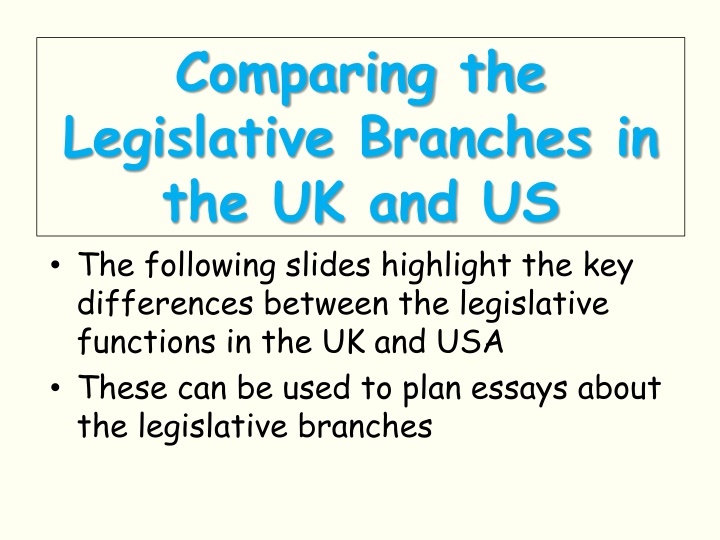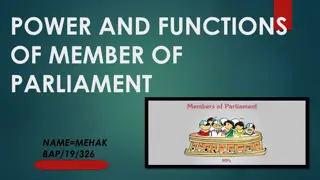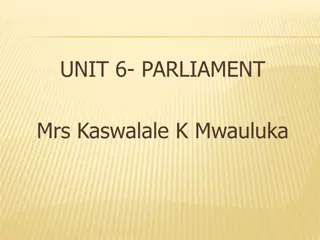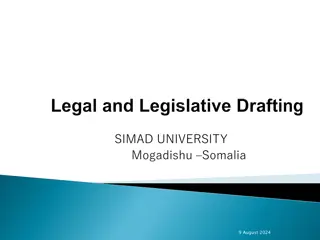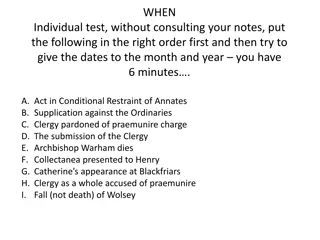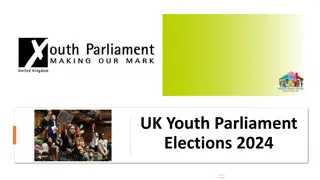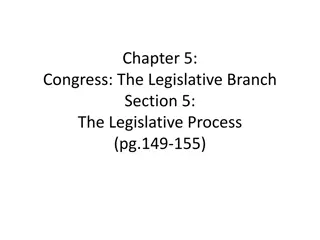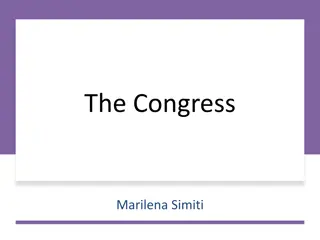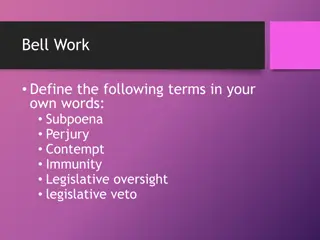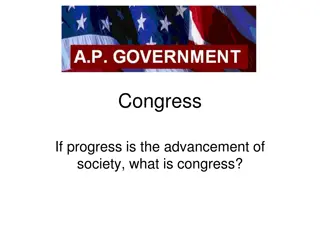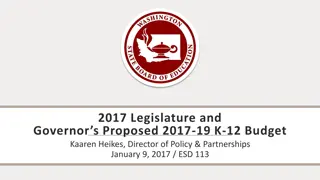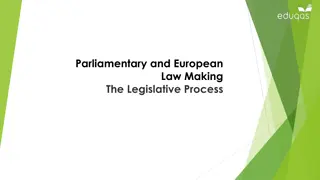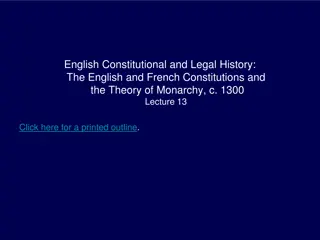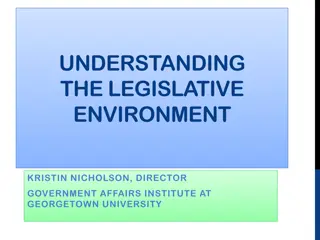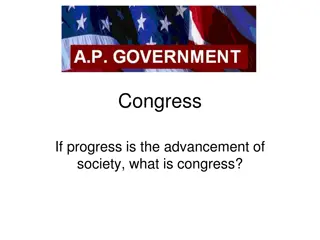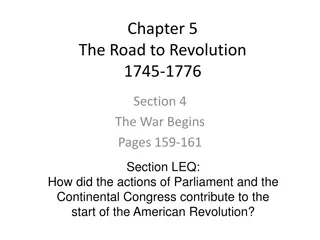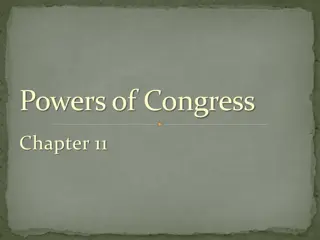Contrasting Legislative Functions: UK Parliament vs. US Congress
Highlighting the key disparities between the legislative roles in the UK Parliament and the US Congress, this collection of slides delineates differences in government programmes of legislation, party discipline, bill introduction and passage, committee stages, standing committees, presidential/royal assent powers, and individual MP/congressional member bill introductions.
Download Presentation

Please find below an Image/Link to download the presentation.
The content on the website is provided AS IS for your information and personal use only. It may not be sold, licensed, or shared on other websites without obtaining consent from the author.If you encounter any issues during the download, it is possible that the publisher has removed the file from their server.
You are allowed to download the files provided on this website for personal or commercial use, subject to the condition that they are used lawfully. All files are the property of their respective owners.
The content on the website is provided AS IS for your information and personal use only. It may not be sold, licensed, or shared on other websites without obtaining consent from the author.
E N D
Presentation Transcript
Comparing the Legislative Branches in the UK and US The following slides highlight the key differences between the legislative functions in the UK and USA These can be used to plan essays about the legislative branches
The legislative function in the US Congress and UK Parliament Image result for union jack on UK Image result for USA flag No government programme of legislation exists The level of party discipline is low Republicans turning on each other during Trump era Thousands of bills are introduced in any one session Few of these bills are passed into law The committee stage comes before the second reading A government programme of legislation exists announced every year in the Queen s Speech (Official Opening of Parliament) The level of party discipline is high whip system! A limited number of bills are introduced in any session Most of these bills are passed into law (as they originate from the government) The committee stage comes after the second reading
The legislative function in the US Congress and UK Parliament Image result for union jack on UK Image result for USA flag Standing committees are permanent and policy specialist Bills are usually considered by both houses concurrently The two chambers have equal power The president has the significant power of veto over laws Standing committees are non permanent and non-specialist Bills are considered by both houses consecutively The lower chamber (HoC) dominates Royal assent is a formality and is not withheld The Queen will not refuse to sign bills.
Programmes of government legislation Image result for union jack on UK Image result for USA flag Few opportunities for individual MP s to introduce their own bills Government control of legislative agenda (government majority likely) All legislation introduced by individual members of Congress
Party discipline Image result for union jack on UK Image result for USA flag Votes are much more coalition building within congress- getting enough Democrats and Republicans to support things Esp important in senate when threat of filibuster/tied vote Most votes are party line Government v Opposition Very rare for MP s to oppose their own parties (power of whips)
Number of bills Image result for union jack on UK Image result for USA flag No control of legislative agenda Importance on committees deciding what to prioritise or pigeon hole if a committee side-lines a bill it is basically dead. Importance of rules committee deciding what to timetable to present to the chamber Legislative agenda controlled by government due to their control of parliament
The legislative process Image result for union jack on UK Image result for USA flag Standing committees chairpersons can block bills they don t like Standing committees have full power of amendment President can block any legislation by vetoing it Clinton vetoed 36 laws But congress can override with 2/3 majority (although this is an uncommon occurance) Limited role for standing committees - controlled by whips Government effectively controls amendments by using its majority to vote down amendments it does not like Monarch does not block legislations (last time was in 1707!)
Conclusions - legislative power Image result for union jack on UK Image result for USA flag Legislation is passed by Congress Legislation is the administration s (executive s) wish list State of the union every January President asks congress to implement particular laws. Legislation passes through parliament Legislation is the government s shopping list Queens speech my government will Congress legislates Parliament legitimises legislation
Scrutiny - holding the executive to account Image result for USA flag Image result for union jack on UK Impeachment Standing committees Select committees Confirmation of appointments (Senate) Ratification of treaties (Senate) Intense media scrutiny Vote of no confidence in the government. Question time (and written questions) Debates Select committees
Scrutiny of appointments Image result for union jack on UK Image result for USA flag Parliament has no control over the Prime Minister s power of patronage choosing of the cabinet Parliament has no power once treaties are signed by government Senate has power to confirm (or reject) all presidential senior appointments Obama s 2nd pick for Supreme Court was never confirmed Senate has to ratify all treaties signed by the president
Scrutiny of workings of government Image result for union jack on UK Image result for USA flag Congress has real power to examine and force officials to appear before it or provide information Various opportunities for MPs to question government ministers but none are particularly effective (FMQs is a political show, no real outcome)
Scrutiny - work of committees Image result for union jack on UK Image result for USA flag Standing committees only deal with legislation and don t have much influence over this Select committees scrutinise government Hold hearings but cannot force government to release information or get ministers to appear Standing committees both legislate and scrutinise Well staffed, well funded, powerful Hold hearings, carry out investigations, force witnesses to attend or documents to be handed over
Analyse the effectiveness of political assemblies abilities to scrutinise the government in two political systems you have studied. (12) Overall Plan: Paragraph Plan: Topic sentence K description + example on UK K description + example on USA Analysis, showing comparison, relate to the essay question. - - Short Intro (see handout) 3 paragraphs comparing elements of scrutiny in UK/USA One/Two sentence conclusion summarising what you have said. -
One way in which the House of Commons can scrutinise the work of the UK Government is through questioning of Government ministers however, as the executive and legislative branches are separated in the USA, scrutiny is carried out via the media. (topic sentence) Every week, MPs are given the opportunity to directly question both the Prime Minister and other members of government on their decisions, the most obvious example being Prime Question Time. Every Wednesday the PM must answer questions from backbench MPs on his/her government s actions, allowing the legislative branch to scrutinise the work of the executive in a public manner. For example (PMQs) (K description + example on UK) However, in the USA, the legislative and executive branches are completely separate therefore, much of the scrutiny of the government will come from the media. In particular, congressional hearings are openly public and often come under heavy scrutiny from the various media outlets in America. C-Span is a network dedicated to showing congressional hearings and meetings and this ensures that scrutiny can occur on a daily basis. For example, (see USA scrutiny PP) (K description + example on USA) Therefore, in the UK question time does produce the opportunity for the legislative to scrutinise the government in a very public way, however, the US Congress can use publicity of high profile hearings as means of publicly scrutinising the government, due to a lack of equivalent of UK question time. As such, it can be said that scrutiny in the UK is more effective than in the USA, in this manner, as the legislative can directly critique the government and its decisions. (Analysis, showing comparison)
